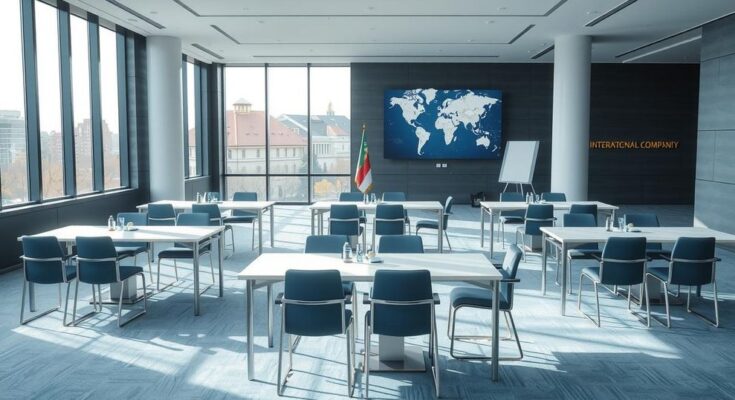Syria will attend a donor conference for the first time, seeking international support after Assad’s ousting. Hosted by the EU, the conference aims to garner aid for reconstruction and address economic challenges amid ongoing violence. Security and humanitarian issues continue to complicate the transition, despite a new interim government’s efforts to establish legitimacy.
Syria is poised to participate in a donor conference for the first time on Monday, marking a significant milestone for its new leadership. This meeting, organized by the European Union in Brussels, aims to gather international support for Syria’s transition post-Bashar Assad. The conference will be attended by Syria’s Foreign Minister, Asaad Hassan al-Shibani, as ministers from various nations and organizations convene to discuss assistance and reconstruction strategies.
The conference occurs amid ongoing instability as new leaders strive to consolidate control over a fragmented nation ravaged by nearly 14 years of civil war. Estimates suggest that rebuilding Syria’s economy and infrastructure would require a minimum of $250 billion, with some experts raising projections to approximately $400 billion. Despite the challenges, Syria’s interim government seeks to enhance its legitimacy and obtain short-term aid while navigating the impact of severe Western sanctions imposed during Assad’s regime.
Security remains a critical concern as recent violent clashes have occurred, prompting the European Union to advocate for the respect of Syria’s sovereignty and inclusive governance. Furthermore, a separate meeting of EU foreign ministers will assess the country’s evolving situation on the same day. While the EU has started to relax certain sanctions, its wariness persists, reflecting the complex political landscape surrounding Syria’s interim rulers.
Syria’s interim president, Ahmad al-Sharaa, has signed a temporary constitution that maintains Islamic governance for a transitional period of five years. While the removal of the Assad regime has garnered some support, religious and ethnic minorities express apprehension regarding the new leadership’s control, fearing potential marginalization.
The humanitarian crises remain dire, with minimal access to electricity and widespread destruction of infrastructure. The U.N. refugee agency has reported that millions have been displaced internally, while over 4.7 million refugees reside in neighboring countries amidst these hardships. Despite these challenges, U.N. humanitarian chief Tom Fletcher has indicated improved operational conditions within Syria compared to the Assad era. The conference aims not only to secure aid but also to address critical economic needs, emphasizing the importance of stabilization for recovery efforts.
Syria’s participation in the upcoming donor conference represents a pivotal moment for the nation’s new leadership as it seeks international support for reconstruction and legitimacy. The ongoing violence and humanitarian challenges complicate this transition, but there is cautious optimism regarding potential cooperation and assistance. The European Union’s balancing act between offering support and maintaining oversight underscores the intricate political landscape that Syria’s interim rulers must navigate to stabilize and rebuild their nation.
Original Source: apnews.com




